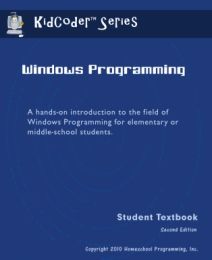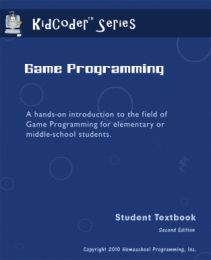
- Homeschool Programming, Inc.
- KidCoder Series: Windows Programming, Game Programming
- Ages: 6th-8th grades
- Price
- KidCoder Visual Basic Year Pack $120
- KidCoder Visual Basic text and videos –$145
- KidCoder Visual Basic Year pack videos only—$30
- Each semester is available separately. Visit the Homeschool Programming page to see the individual semester prices.
About the Product

KidCoder Visual Basic Series from Homeschool Programming is a course designed for 6th through 8th grades to learn how to program using Visual Basic Express 2010. Visual Basic Express is a free computer programing language.
There are two courses which, if used one after the other, will comprise a full year of computer programming. The first semester covers Windows Programming and the second semester is Game Programming. In Windows Programming students will build fundamental programming skills. In Game Programming students will learn how to write computer games.
No prior experience in programming is necessary to be successful in completing the course. Basic computer skills are all that is required to use this course. Being familiar with the keyboard and mouse, how to run programs and just being able to interact with their computer is recommended. There are specific requirements for your computer before starting the KidCoder Visual Basic course. They are as follows:
Computer Hardware
Your computer must meet the following minimum specifications:
Minimum CPU
1.6GHz or faster processor
RAM
1024 MB
Display
1024 x 768 compatible video card
Hard Disk Size
3GB available space
DVD Drive
DVD-ROM drive
The KidCoder Visual Basic Series is a self study course. Each chapter is written so that the student can work independent of a parent. There are multiple visual aids to assist in figuring out what your screen should look like.
There are a variety of topics included in the two semesters of KidCoder. These include the following:
- Introduction to computer hardware, software and programming history
- Using the Microsoft Visual Basic 2010 Express development environment
- Managing numeric and text data
- Making decisions about program flow
- Obtaining and validating user input
- Working with numbers and math operations
- Working with strings (text)
- Learning how to debug (find errors in) your code
- Learning how to write loops to execute sections of code many times
- Working with arrays (sets of data)
- Publishing your programs to other computers
- Putting it all together – write a simple graphical game!
Each chapter includes three to five lessons, a chapter review, then a “Your Turn” which allows the students to practice what they have learned in the chapter. There are 14 chapters in each semester book of KidCoder Visual Basic. By completing one chapter a week, KidCoder is a year long course.
Also available are videos to help your audio/visual learner be successful at programming. The videos are full color, with good visual graphics to demonstrate the lesson. A pleasant voice conveys the information while the words and animated visuals are placed on the screen. The videos are a supplement to the KidCoder Visual Basic coarse. They do not teach the full course but reinforce the content of each lesson.
ClarkClan Experiences
Ben is the kid that reviewed this product in our family. He is 11 years old and in 6th/7th grade. He was excited to begin as he is very interested in computer programming.
Because this is a course written for students to pursue on their own, I let Ben attack this on his own. I told him if he had questions, he could ask his dad or older brother. Well, he took off with my lap top, after I installed the Visual Basic Express 2010 on my computer. He never had any questions. He would read the chapter, working through it. He never seemed to have a problem understanding any of the chapters because he never had to ask any questions. He was so excited about the program, he invited his 12 year old cousin over to work a couple chapters with him.
One note on how we used this. I gave this to Ben as a fun to do, but required course. Because of this, I did not use the chapter tests which are included. If you are looking to use this course for credit you may give the tests and keep grades.
Since Ben was the person who actually worked the program, I interviewed him for his opinions on the program. Here is the interview with my questions in bold and his word for word answers in italics.
KidCoder Interview
Did you like the KidCoder program? Yes
Did you find it easy to use? Yes except when you make a mistake, but that is hard with any computer programming. Going back to find your mistake and fix it is time consuming. I once spent 15 minutes trying to erase a mistake I made. But I was able to get it fixed.
Were the chapters easy to understand? Yes
Why?They were easy to read and went step by step.
Were there visual aids? Yes
Were the visual aids understandable? Yes, a few were a little different than what I saw on my screen, but by reading farther on I found the answer easily.
Did you like the programs you wrote? Yes, they were fun to show to other people.
You showed the course to your cousin. Did he like it? Yes, he and I had a good time working together.
Would you recommend this course to others? Probably yes. If you don’t like to read it would be bad because there is quite a lot of reading involved. I would recommend it because it is fun and easy to understand. I like computer programming and this course shows me how to do it.
A note about the available videos. Ben and I watched a few of the videos, but we realized quickly that Ben does just fine with the book and computer. He did not need the videos to be successful. We did feel that the videos were well done and informative.
Recommendation
I would highly recommend KidCoder Visual Basic programming. Ben had a great time with it. I liked that he was able to work independently and achieve great results. He will be continuing with this course until he finishes it.
Many of my Schoolhouse Crew Mates reviewed a variety of computer programming courses from Homeschool Programming. Read the Crew Blog to find out what they have to say about this resource.




No comments:
Post a Comment